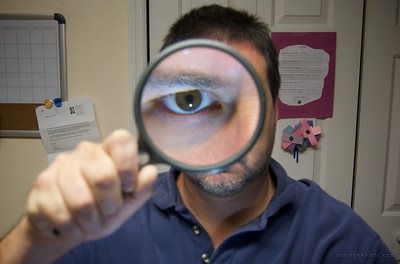Archive for the ‘Trust’ Category
The Difficulty of Goal Setting in Domains of High Uncertainty
 When you work in domains of high uncertainty, creating goals for the next year is exceptionally difficult.
When you work in domains of high uncertainty, creating goals for the next year is exceptionally difficult.
When you try to do something that hasn’t been done before, things may blow up instantly, things may work out after two years of hard work, or things may never work. So, how do you create the goal for that work? Do you give yourself one month to complete the work? And things haven’t worked out at the end of the month, do you stop the work or do you keep going? If it blows up instantly, but you think you know why, do you keep going? Do you extend the due date for the goal? At the start of the work, should the timeline have been set to one year instead of one month? And who decides that? And how do they decide?
When you have to create your goals for something that hasn’t been done before and the objectives of the work are defined by another team, yet that team hasn’t done the prework and cannot provide those objectives, what do you do? Do you create a goal for the other team to define the objectives? And what if you have no control over that team’s priorities and you don’t know when (or if) they’ll provide the needed information? What does a goal look like when you don’t know the objectives of the work nor do you know when (or if) you’ll get that information. Can you even create a goal for the work when you don’t know what that work is? And how do you estimate a completion date or the resource requirements (both the flavor and quantity) when you don’t know the objectives? What does that goal look like?
When you have to create your goals for a team of ten specialized people who each have unique skills, but you don’t know the objectives of the work, when that work can start, or when that work will finish, how do you cascade the team’s goals to each team members? What do their goals look like? Is the first goal to figure out the goal? How many goals does it take to fill up their year when you don’t know what the work is or how long it will take?
When working in domains of high uncertainty, the goals go like this: define the system as it is, define something you want to improve, try to improve it, and then do the next right thing. Unfortunately, that doesn’t fit well with the traditional process of setting yearly goals.
And your two questions should be: How do you decide what to improve? and How do you choose the next right thing?
Image credit — Rab Lawrence
Speaking your truth is objective evidence you care.
 When you see something, do you care enough to say something?
When you see something, do you care enough to say something?
If you disagree, do you care enough to say it out loud?
When the emperor has no clothes, do you care enough to hand them a cover-up?
Cynicism is grounded in caring. Do you care enough to be cynical?
Agreement without truth is not agreement. Do you care enough to disagree?
Violation of the status quo creates conflict. Do you care enough to violate?
If you care, speak your truth.
“Great Grey Owl (Strix nebulosa)” by Bernard Spragg is marked with CC0 1.0.
What does work look like?
 What does work look like when you prioritize your happiness?
What does work look like when you prioritize your happiness?
When it’s announced that open positions will not be backfilled to meet the practical realities of a recession, you reduce the scope of your projects and push out their completion dates to match the reduction in resources. And the impact on your career? I don’t know, but the people that work for you and everyone else that knows how the work is done will move mountains for you.
Under the banner of standard work, you are given the same task as the one you just completed. Sure, you can do it efficiently and effectively, but if you do that same work one more time, your brain will fall off. So, instead of doing it yourself, you give the work to a lesser-experienced person who is worthy of investment and help them get the work done. They get to learn new skills and the work is done well because you keep them on the straight and narrow. And you get to be a teacher and create a future leader that the company will need in a couple of years. And the downside? The work takes a little longer, but so what.
What does work look like when you prioritize your health?
When an extra-early meeting is scheduled because everyone’s regular day is already fully booked with meetings, you decline the meeting so you can get the recommended amount of sleep recommended by the health professionals. And the negative consequences to your career progression? Well, that’s a choice for your company.
When you get home from work, you disconnect your phone from the company network so you won’t be distracted by work-related interruptions. Because you separated yourself from work, after dinner is cleaned up you can make a healthy lunch for tomorrow. If there’s some downside risk to your career, find another company to work for.
What does work look like when you prioritize your family?
When an extra-late meeting is scheduled because everyone’s regular day is already fully booked with meetings, you decline the meeting so you can cook dinner and eat with your family. The conversation with the kids is mundane and meaningful and ten years from now they’ll be better for it. And the negative consequences? None, because tomorrow morning you can read the minutes of the meeting.
When you’re on your yearly holiday with your family and your boss calls your cell phone to ask you to come back to work early to deal with an emergency, you don’t answer the call and let it go to voicemail. Then, when you get back to the office after vacation, you listen to the voicemail and check in with your boss. And because you didn’t pick up the call, someone else had greatness thrust upon them and developed into someone who can solve emergencies. Now there are two of you. And the downside? Well, I think that depends on your boss.
“Looking For Clues (188 / 365)” by somegeekintn is licensed under CC BY 2.0.
Rediscovering The Power of Getting Together In-Person
 When you spend time with a group in person, you get to know them in ways that can’t be known if you spend time with them using electronic means. When meeting in person, you can tell when someone says something that’s difficult for them. And you can also tell when that difficulty is fake. When using screens, those two situations look the same, but, in person, you know they are different. There’s no way to quantify the value of that type of discernment, but the value borders on pricelessness.
When you spend time with a group in person, you get to know them in ways that can’t be known if you spend time with them using electronic means. When meeting in person, you can tell when someone says something that’s difficult for them. And you can also tell when that difficulty is fake. When using screens, those two situations look the same, but, in person, you know they are different. There’s no way to quantify the value of that type of discernment, but the value borders on pricelessness.
When people know you see them as they really are, they know you care. And they like that because they know your discernment requires significant effort. Sure, at first, they may be uncomfortable because you can see them as they are, but, over time, they learn that your ability to see them as they are is a sign of their importance. And there’s no need to call this out explicitly because all that learning comes as a natural byproduct of meeting in person.
And the game changes when people know you see them (and accept them) for who they are. The breadth of topics that can be discussed becomes almost limitless. Personal stories flow; family experiences bubble to the surface; misunderstandings are discussed openly; vulnerable thoughts and feelings are safely expressed; and trust deepens.
I think we’ve forgotten the power of working together in person, but it only takes three days of in-person project work to help us remember. If you have an important project deliverable, I suggest you organize a three-day, in-person event where a small group gets together to work on the deliverable. Create a formal agenda where it’s 50% work and 50% not work. (I’ve found that the 50% not work is the most valuable and productive.) Make it focused and make it personal. Cook food for the group. Go off-site to a museum. Go for a hike. And work hard. But, most importantly, spend time together.
Things will be different after the three-day event. Sure, you’ll make progress on your project deliverable, but, more importantly, you’ll create the conditions for the group to do amazing work over the next five years.
“Elephants Amboseli” by blieusong is licensed under CC BY-SA 2.0.
Do you build trust or break it?
When someone tells you their truth, what do you do? Do you ask them to defend? Do you tell them what you think? Do you dismiss them? Do you listen? Do you believe them?
When someone has the courage to tell you their truth, they demonstrate they trust you. If you want to destroy their trust, ask them to defend their truth. Sooner or later, or then and there, they’ll stop trusting you. And like falling off a cliff, it’s almost impossible for things to be the same.
When someone confesses their truth, they demonstrate they trust you enough to share a difficult issue with you. If you want them to feel small and block them from sharing their truth in the future, tell them why their truth isn’t right. That will be the last time they speak candidly with you. Ever.
When someone reluctantly shares their truth, they demonstrate they’re willing to push through their discomfort due to the significance and their trust in you. If you want them to get angry, explain how they see things incorrectly or tell them what they don’t understand. Either one will cause them to move to a purely transactional relationship with you. And there’s no coming back from that.
When someone confides in you and shares their truth, you ask them to defend it, and, despite your unskillful response they share it again, believe them. And if you don’t, you’ll damn yourself twice.
When someone shares their truth and you listen without judging, you build trust.
When someone sends you a heartfelt email describing a dilemma and your response is to set up a meeting to gain a fuller understanding, you build trust.
When someone demonstrates the courage to share a truth that they know contradicts the mission, believe them. You’ll build trust.
When someone shares their truth, you have an opportunity to build trust or break it. Which will you choose?
Image credit — Christian Scheja
Tell the truth, especially when it’s difficult.
 Our behavior is a result of causes and conditions. One thing paves the way for the next. Elements of the first thing create a preferential path for the next thing. If someone gets praised for doing A, more people will do A, even when A is the wrong behavior. If someone gets chastised for doing B, B won’t happen again, even when B is the right behavior.
Our behavior is a result of causes and conditions. One thing paves the way for the next. Elements of the first thing create a preferential path for the next thing. If someone gets praised for doing A, more people will do A, even when A is the wrong behavior. If someone gets chastised for doing B, B won’t happen again, even when B is the right behavior.
The most troubling set of causes and conditions are those that block people from telling their truth. When everyone knows it’s a bad idea, but no one is willing to say it out loud, that’s a big problem. In fact, it may be the biggest problem.
When people think they won’t be taken seriously, they keep their truth to themselves. When people know they will be dismissed, they keep quiet. When people feel the situation is hopeless because there’s no way they’ll be listened to, they say nothing.
When people see others not taken seriously, that creates conditions for future truths to be withheld. When people see others being dismissed, that creates conditions for future truths to be kept quiet. When people see others in others from not being listened to, that creates conditions for future truths to remain unsaid.
And causes and conditions are self-strengthening. The more causes and conditions are reinforced, the more the behaviors become ingrained. The more people are stifled, the more they will keep quiet. The more people are dismissed, the more they’ll shut up. The more people’s truths are ignored, the more they’ll remain unsaid.
Here are three rules for truth-telling that will help you and your company move forward:
- Without truth-telling, there can be no truth-telling.
- The longer truth-telling is stifled, the harder it is for truth-telling to reemerge.
- Truth-telling begets truth-telling.
Image credit — Jinterwas
Did you make a difference today?
Did you engage today with someone that needed your time and attention, though they didn’t ask? You had a choice to float above it all or recognize that your time and attention were needed. And then you had a follow-on choice: to keep on truckin’ or engage. If you recognized they needed your help, what caused you to spend the energy needed to do that? And if you took the further step to engage, why did you do that? For both questions, I bet the answer is the same – because you care about them and you care about the work. And I bet they know that and I bet you made a difference.
Did you alter your schedule today because something important came up? What caused you to do that? Was it about the thing that came up or the person(s) impacted by the thing that came up? I bet it was the latter. And I bet you made a difference.
Did you spend a lot of energy at work today? If so, why did you do that? Was it because you care about the people you work with? Was it because you care about your customers? Was it because you care enough about yourself to live up to your best expectations? I bet it was all those reasons. And I bet you made a difference.
Image credit — Dr. Matthias Ripp
Small Teams are Mighty
 When you want new thinking or rapid progress, create a small team.
When you want new thinking or rapid progress, create a small team.
When you have a small team, they manage the handoffs on their own and help each other.
Small teams hold themselves accountable.
With small teams, one member’s problem becomes everyone’s problem in record time.
Small teams can’t work on more than one project at a time because it’s a small team.
And when a small team works on a single project, progress is rapid.
Small teams use their judgment because they have to.
The judgment of small teams is good because they use it often.
On small teams, team members are loyal to each other and set clear expectations.
Small teams coordinate and phase the work as needed.
With small teams, waiting is reduced because the team members see it immediately.
When something breaks, small teams fix it quickly because the breakage is apparent to all.
The tight connections of a small team are magic.
Small teams are fun.
Small teams are effective.
And small teams are powered by trust.
“LEGO Octan pit crew celebrating High Five Day (held every third Thursday of April)” by Pest15 is marked with CC BY-SA 2.0.
Why are people leaving your company?
 People don’t leave a company because they feel appreciated.
People don’t leave a company because they feel appreciated.
People don’t leave a company because they feel part of something bigger than themselves.
People don’t leave a company because they see a huge financial upside if they stay.
People don’t leave a company because they are treated with kindness and respect.
People don’t leave a company because they can make less money elsewhere.
People don’t leave a company because they see good career growth in their future.
People don’t leave a company because they know all the key players and know how to get things done.
People don’t leave the company so they can abandon their primary care physician.
People don’t leave a company because their career path is paved with gold.
People don’t leave a company because they are highly engaged in their work.
People don’t leave a company because they want to uproot their kids and start them in a new school.
People don’t leave a company because their boss treats them too well.
People don’t leave a company because their work is meaningful.
People don’t leave a company because their coworkers treat them with respect.
People don’t leave a company because they want to pay the commission on a real estate transaction.
People don’t leave a company because they’ve spent a decade building a Trust Network.
People don’t leave a company because they want their kids to learn to trust a new dentist.
People don’t leave a company because they have a flexible work arrangement.
People don’t leave a company because they feel safe on the job.
People don’t leave a company because they are trusted to use their judgment.
People don’t leave the company because they want the joy that comes from rolling over their 401k.
People don’t leave a company when they have the tools and resources to get the work done.
People don’t leave a company when their workload is in line with their capacity to get it done.
People don’t leave a company when they feel valued.
People don’t leave a company so they can learn a whole new medical benefits plan.
People don’t leave a job because they get to do the work the way they think it should be done.
So, I ask you, why are people leaving your company?
“Penguins on Parade” by D-Stanley is licensed under
Effective Interactions During Difficult Times
 When times are stressful, it’s more difficult to be effective and skillful in our interactions with others. Here are some thoughts that could help.
When times are stressful, it’s more difficult to be effective and skillful in our interactions with others. Here are some thoughts that could help.
Decide how you want to respond, and then respond accordingly.
Before you respond, take a breath. Your response will be better.
If you find yourself responding before giving yourself permission, stop your response and come clean.
Better responses from you make for even better responses from others.
If you interrupt someone in the middle of their sentence so you can make your point, you made a different point.
If you find yourself preparing your response while listening to someone, that’s not listening.
If you recognize you’re not listening, now there are at least two people who know the truth.
When there are no words coming from your mouth, that doesn’t constitute listening.
The strongest deterrent to listening is talking.
If you disagree with one element of a person’s position, you can, at the same time, agree with other elements of their position. That’s how agreement works.
If you start with agreement, even the smallest bit, disagreement softens.
Before you can disagree, it’s important to listen and understand. And it’s the same with agreement.
It’s easy to agree if that’s what you want to accomplish. And it’s the same for disagreement.
If you want to move toward agreement, start with understanding.
If you want to demonstrate understanding, start with listening.
If you want to demonstrate good listening, start with kindness.
Here are three mantras I find helpful:
Talk less to listen more.
Before you respond, take a breath.
Kindness before agreement.
“Rock-em” by REL Waldman is licensed under CC BY-SA 2.0
When you decide you have enough, the right work WILL happen.
 If you are happy with what you have, others have no power over you.
If you are happy with what you have, others have no power over you.
If you don’t want more, you call the shots.
If you have nothing to prove, no one can manipulate you.
If you have enough, the lure of more cannot pull you off the path of what you think is right.
If you don’t need approval from others, you can do what you think is right.
If you know what’s important to you, you can choose the path forward.
If you know who you are, so does everyone else.
If you know who you are, you don’t care what others think of you.
When you don’t care about what others think about you, you can do the right work.
When you can do the right work in the right way, you are impervious to influence.
When you are impervious to influence, the right work happens, despite the displeasure of the Status Quo.
Anne Ruthmann is licensed under CC BY-NC-ND 2.0


 Mike Shipulski
Mike Shipulski